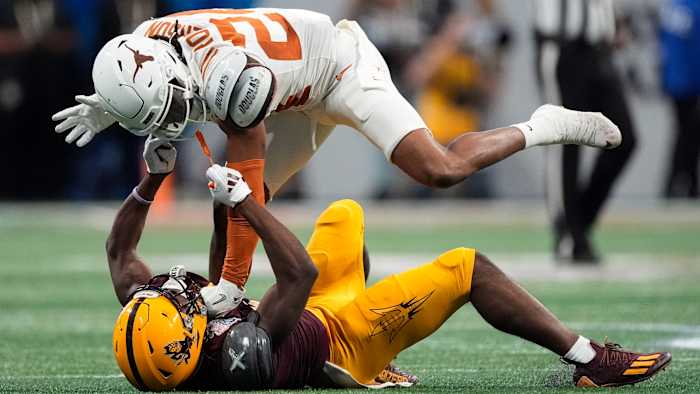In the wake of a contentious moment during the recent College Football Playoff quarterfinal, Big 12 commissioner Brett Yormark has emphasized the need for clear guidelines on targeting penalties. The call follows a disputed incident involving Texas safety Michael Taaffe and Arizona State receiver Melquan Stovall.
During the final minutes of the match held at the Peach Bowl, Texas safety Michael Taaffe delivered a helmet-to-helmet hit on Arizona State’s Melquan Stovall as the latter attempted to catch a pass. This high-impact moment transpired with only 1:15 left in regulation and with the scores tied. Despite the severity of the hit, no penalization was issued on the field, prompting referee Larry Smith to stop the game for a replay review. After review, Smith concluded that no foul had occurred, leading to Arizona State punting rather than potentially winning with a field goal attempt. The game later extended into two overtimes, where Texas emerged victorious with a score of 39-31.
In response to this controversial no-call, Brett Yormark released a statement recognizing Arizona State’s performance but highlighted his concern over the lack of consistency in officiating key plays. Yormark, who is part of the College Football Playoff management committee, confirmed ongoing discussions with CFP executive director Richard Clark about this incident. He stressed that developing national standards for officiating, particularly concerning critical calls like targeting, is essential for the integrity and future of college football.
Yormark intends to bring this issue to the forefront in upcoming meetings with his peers on the committee, advocating for a unified approach to what constitutes targeting across all games and teams. This standardization is seen as a pivotal step in ensuring fairness and clarity in officiating, which can significantly affect the outcomes of high-stakes games.
The absence of a uniform standard for targeting not only raises questions about fairness but also player safety. Helmet-to-helmet contact poses serious risks, making it vital for officials to have a clear and consistent framework when making such judgments. The controversy has reignited debates among sports analysts and fans alike regarding the current rules and their implementation.
As discussions continue among college football officials, the emphasis on establishing consistent targeting standards remains a priority for the sport’s stakeholders. The Peach Bowl incident serves as a potent reminder of the potential implications of ambiguous officiating, highlighting the need for transparency and uniformity in calling such significant penalties.
Source: Local10








